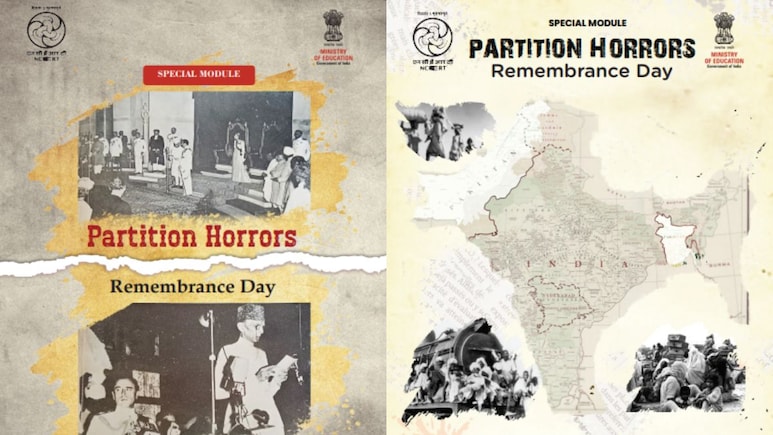
- Jinnah, Congress leadership, and Viceroy Mountbatten are blamed for the Partition of India
- NCERT modules mark 14 August as Partition Horrors Remembrance Day, quoting PM Modi
- Middle-stage module says Partition was avoidable but accepted to prevent civil war
A new special module by the National Council of Education Research and Training (NCERT) has blamed three figures as responsible for the Partition of India, including Muhammad Ali Jinnah, the Congress leadership, and then Viceroy Lord Mountbatten. The module, created for 'Partition Horrors Remembrance Day', observed every year on August 14, states, "Jinnah, who demanded it; second, the Congress, which accepted it; and third, Mountbatten, who implemented it."
This reference appears in a section titled 'Culprits of the Partition' in the module designed for Classes 6 to 8. Alongside, it also carries a speech by Jawaharlal Nehru from July 1947, which reads, "We have come to a stage when we must either accept division or face continued conflict and chaos. Partition is bad. But whatever the price of unity, the price of civil war would be infinitely greater."
What The Modules Say
NCERT has published two separate modules-one for Classes 6 to 8 (middle stage) and another for Classes 9 to 12 (secondary stage). These are supplementary resources in English and Hindi, not part of regular textbooks, and are meant to be used through projects, posters, discussions and debates.
Both modules open with Prime Minister Narendra Modi's 2021 message announcing the observance of Partition Horrors Remembrance Day. Quoting his post on X (formerly Twitter), the book mentions, "Partition's pains can never be forgotten. Millions of our sisters and brothers were displaced, and many lost their lives due to mindless hate and violence. In memory of the struggles and sacrifices of our people, 14th August will be observed as Partition Horrors Remembrance Day."
Middle-Stage Module
The middle-stage module asserts that Partition "was not inevitable" and resulted from "wrong ideas." It also mentions Nehru and Patel accepted Partition fearing civil war, after which Mahatma Gandhi too gave up his opposition. "In fact, Nehru and Patel accepted Partition due to the fear of civil war. Upon their agreeing, Mahatma Gandhi, also gave up his opposition...," it notes.
The module also says that Gandhi opposed it "not with violence or anger". Patel called it "bitter medicine," while Nehru described it as "bad" but unavoidable.
Secondary-Stage Module
The secondary-stage module traces Partition to Muslim leaders' belief in a separate identity rooted in "political Islam," which it claims "rejects any permanent equality with non-Muslims." It states that this ideology drove the Pakistan movement, with Jinnah as its "able lawyer-leader."
It highlights how, after Mountbatten became Viceroy in March 1947, escalating violence and Jinnah's insistence led Nehru and Patel to agree to the division. On June 3, 1947, Mountbatten announced the Partition plan accepted by both Congress and the Muslim League.
The module describes Partition as having "no parallel in world history." Between 1947 and 1950, it says, the division fractured India's unity, devastated Punjab and Bengal's economies, triggered mass killings and displacement, deepened communal distrust, and set Jammu and Kashmir on a path of turmoil that later worsened with terrorism.
In a section titled 'Long-Term Losses - still ongoing', the book states, "India continues to face both external hostility and internal communal fragmentation. The same suspicion and animosity between the two major communities still persists - the very sentiment that had led to Partition."
It further links the Partition to the Kashmir conflict, wars with Pakistan, terrorism, and India's high defence costs. According to the text, foreign powers backing Pakistan to pressure India have left lasting strains on the country's foreign policy.
Track Latest News Live on NDTV.com and get news updates from India and around the world

